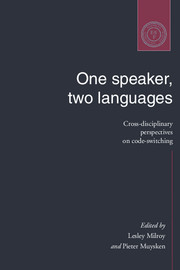Book contents
- Frontmatter
- Contents
- Notes on contributors
- Acknowledgments
- 1 Introduction: code-switching and bilingualism research
- Part one Code-switching in institutional and community settings
- Part two Code-switching and social life
- Part three Grammatical constraints on code-switching
- Part four Code-switching in bilingual development and processing
- Index
1 - Introduction: code-switching and bilingualism research
Published online by Cambridge University Press: 05 June 2012
- Frontmatter
- Contents
- Notes on contributors
- Acknowledgments
- 1 Introduction: code-switching and bilingualism research
- Part one Code-switching in institutional and community settings
- Part two Code-switching and social life
- Part three Grammatical constraints on code-switching
- Part four Code-switching in bilingual development and processing
- Index
Summary
The contemporary setting of bilingualism studies
In the last forty years or so, developments such as the expansion of educational provision to many more levels of society, massive population shifts through migration, and technological advances in mass communication have served to accentuate our sense of a visibly and audibly multilingual modern world. Other large-scale social changes have combined to lead to a considerable increase in bilingualism, not only as a European but as a world-wide phenomenon.
First, modernisation and globalisation have stimulated the expansion in numbers of people speaking national languages located within relatively limited boundaries alongside international languages such as English, French and Spanish. As a consequence of centuries of colonisation, these have spread far beyond their original territories, and there is every sign that their spread as second or auxiliary languages for large numbers of speakers is continuing. Indeed, they are being joined by other languages of economically powerful nations, such as Japanese and Arabic. Furthermore, new multilingual nations have emerged in the years since the Second World War, where linguistic minorities are increasingly becoming bilingual, not only in the language of their own social group and the national language, but often additionally in one of these international languages.
A second development leading to increasing bilingualism is the relatively recent phenomenon of large-scale language revival. There are many nation states in Europe – Switzerland and Belgium are well-known examples – where bilingualism is institutionalised and historically deep-rooted.
- Type
- Chapter
- Information
- One Speaker, Two LanguagesCross-Disciplinary Perspectives on Code-Switching, pp. 1 - 14Publisher: Cambridge University PressPrint publication year: 1995
- 37
- Cited by

